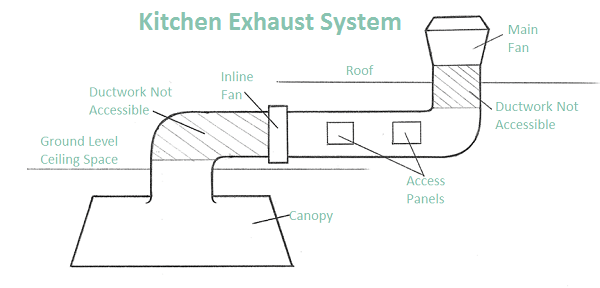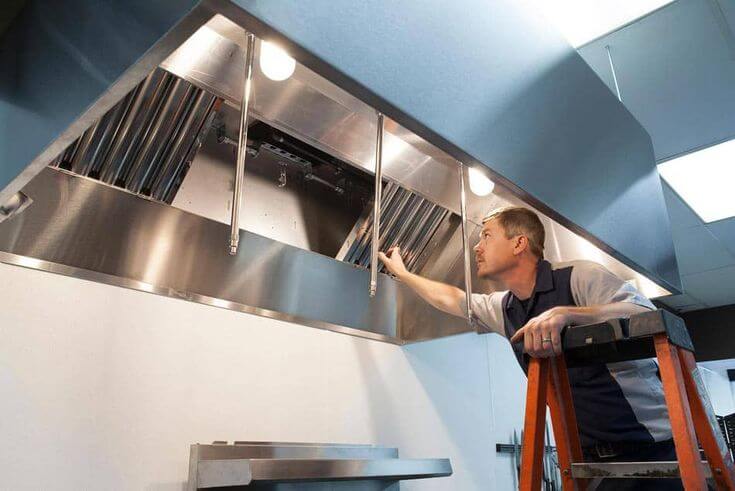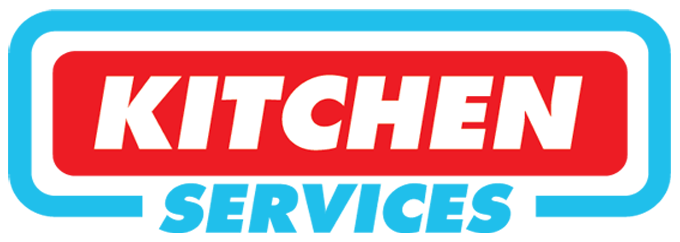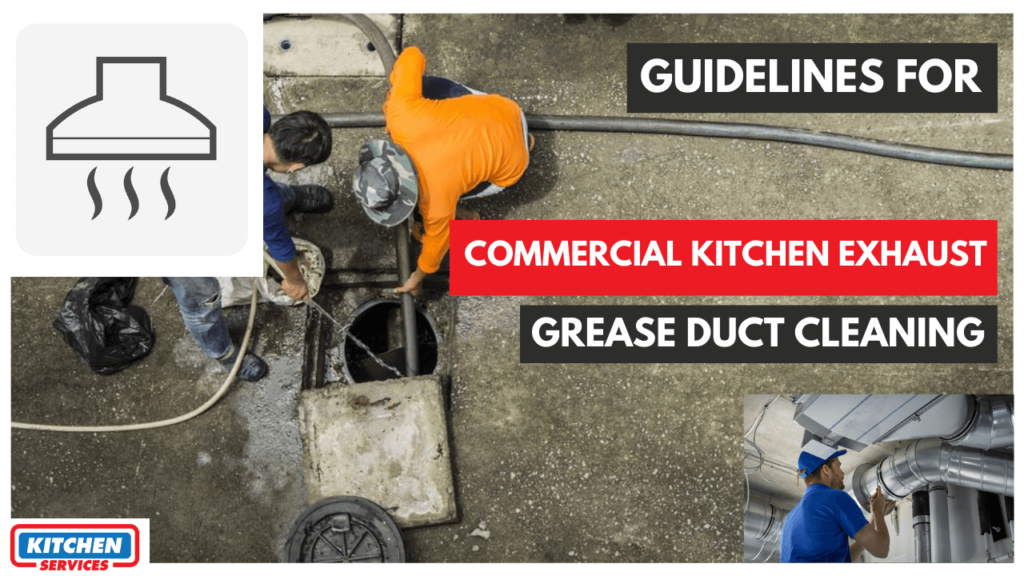Maintaining a commercial kitchen exhaust grease duct is more complicated than it looks. The system is custom-designed with many factors to consider. A major concern is the buildup of grease and oil, which can become a serious fire hazard if not properly handled. Regular kitchen exhaust grease duct cleaning and maintenance are essential to keep your kitchen safe and running smoothly.
You will need a professional exhaust duct cleaning service for your commercial kitchen exhaust system which truly depends on the level of the usage of the kind of cooking equipment, types, and quantity of cooking. Dedicated cleaning of your kitchen exhaust duct system is very important for the reason of reducing a lot of risks, such as grease fire, hygiene, health-related issues, insects, as well as mechanical hazards.
Kitchen Exhaust System

Your typical exhaust system has a number of parts to it:
- Filters – filters lie within the canopy hood, and they are specifically designed to trap all sorts of grease, oil, and other particulates from the cooking process and equipment that is coming from below.
- Canopy hood – it is also known as a range hood, exhaust hood, or exhaust canopy.
- Canopy or Exhaust plenum – This is basically the area that is right there behind the filters.
- Ducting – Ducting is attached beyond the canopy attachment. This can also involve short modulation ducts or may include many linear meters of horizontal and vertical ductwork. Vertical ductworks are actually referred to as risers, this can also pass through many levels of a building.
- Exhaust Fan – in order to create extraction from the canopy an exhaust fan is usually connected to its ductwork. Exhaust fans discharge directly into the atmosphere through a cowl.
- Fire Protection Systems – this refers to an automatic system that is meant to control or suppress fires that may occur in the kitchen exhaust system. It truly depends on the system that is provided, sprinklers and/or nozzles may be present in the canopy, plenum, and ducting.
Related: How To Keep Your Commercial Kitchen Clean
Kitchen Exhaust systems cleaning
We may find in many research that the general guidelines for kitchen exhaust system’s complete cleaning frequencies are thoroughly provided within the different Standards. These standard does not provide comprehensive baseline frequencies for exhaust fan cleaning. This baseline cleaning frequency has been provided by two leading industry groups; the Building Engineering Services Association (BESA UK TR/19) and the International Kitchen Exhaust Cleaning Association (ANSI/IKECA C10-2016). Whereas a baseline cleaning frequency has been suggested that is totally based on the guidelines, you must carry out constant monitoring of exhaust oil/grease deposits to find out if an increased cleaning frequency should be conducted or if it can still wait.
Kitchen Exhaust Grease Duct Cleaning Problems

When we talk about kitchen exhaust grease duct cleaning, you may see that most of the Standards, Codes, Regulations have stated that hood and canopy cleaning is to be tested for unnecessary grease accumulation at least once a month. The duct and fan of your commercial exhaust should be examined roughly after every six to 12 months, which totally depends on your insurance policy requirements that you must already have. It can be nasty, upsetting and some kitchen exhaust systems can get dirty again and again even after just one month after a clean if you are using traditional filters. Any sort of additional build-up of grease or dust might as well put a store at risk for fire and can quickly build up in between cleans.
You might think that the kitchen exhaust grease duct cleaning would be very costly. It is very essential to keep a proper check and balance if the work is done or cleaned in a proper way. This responsibility is always on the restaurant’s shoulders. Certificates that are issued by cleaning contractors that have any sort of sections or fine print can make the certificate worthless if anything bad happens like the event of a fire and insurance companies may void the claim immediately.
Filters frequently check the kitchen exhausts after getting cleaned and finds either:
- A sub-standard clean has happened
- If not all of the areas of the system were cleaned by cleaning companies due to poor access which they might have followed are true examples when inspecting systems just days after a clean.
If you are looking for commercial kitchen duct cleaning service providers in Los Angeles and surrounding areas, then call Kitchen Services. Our team is the backbone of our organization. They thoroughly carry out your kitchen hood cleaning by using some professional kitchen cleaning tools.
Canopy, Hood and Duct Solution
You really have to stop guessing if your system is dirty if you are using the best quality filters. A clean system protected by good quality filters means you can significantly reduce the extensive hood, canopy, and duct cleaning required. This will ultimately help you save for many years. You will just have to do a simple mini spot inspection and clean only when required.
Kitchen Exhaust Grease Duct Cleaning guide
If you are running a commercial kitchen you must know by now that your cooking equipment is contributing to 61% of fires in commercial food businesses. For instance, a dirty kitchen hood and the exhaust system will speed up the increase in fire at such accommodations, which can result in a lot of losses, injuries, as well as fatalities. Routine-wise maintenance of the kitchen’s exhaust system by a competent contractor can protect against fire hazards and can also improve the service life of your exhaust fans.
Below is a quick guide to help you learn more about Kitchen Exhaust Grease Duct cleaning systems.
Regulations
It is still unknown to a lot of commercial kitchen owners that the regular cleaning of the kitchen’s exhaust system is very important. Specifically, the National Fire Protection Association (NFPA) has already provided the minimum safety standards for any of the design and care of kitchen exhaust systems. As stated by NFPA, the owners of commercial kitchens are accountable for making sure that sufficient inspection, maintenance, cleanliness, and ventilation of the facility’s exhaust system is happening on time. A certified professional should do all these tasks to reduce the risk of fire and related obligations.
Standards
You should know that only the surface cleaning of your kitchen equipment and services is not enough to do. To fulfill all the stated industry guidelines, you should always clean essential components such as ducts, fans, hoods, and all other parts of the kitchen’s exhaust system frequently so that you can avoid the buildup of grease, oil, and debris on these parts.
If you are lazy in terms of cleaned your kitchen exhaust in a proper stated time, you can hire a professional contractor to clean the components to meet all the metal standards. In order to the interpretation of the underlying shiny metal surface of your kitchen’s exhaust system, the contractor would have to use some powerful pressure washing methods and cleaning detergents but that must be mild in nature. You must always encourage employees to clean and maintain the immediate cooking area of your commercial kitchen that includes the exterior of the range hood, backsplash, and grease filters as well. Leave the cleaning of the interior parts of the kitchen exhaust system to an expert.
Scope
Cleaning your exhaust system in a commercial kitchen involves a number of steps. In particular, you may expect your cleaning contractor to do the following steps:
- Disconnect the fans from the ductwork for careful and detailed cleaning
- Examine the exhaust fans for wear and tear
- Eliminate grease, fat, and oil from the hood filters and all other parts of the range hood
- Degrease components of the exhaust system that are available
You may find out if the cleaning services will also include a food- and fire-safe finish to protect stainless steel ductwork against corrosion or not.
Frequency
To avoid the buildup of grease and other pollutants inside your kitchen exhaust, you must schedule regular cleaning and maintenance. The rate of recurrence of cleaning should always depend on your kitchen’s functions. You must thoroughly clean the exhaust system at least once a month if you are used to cooking using solid fuels for instance coal or lumber and every after three months for high-intensity, day, and night cooking, as is obviously the case with busy restaurants that are working round the clock. You may also clean your kitchen exhaust once or twice a year for medium to low-volume kitchen operations.
Related: Importance of Air Duct system cleaning
Conclusion
Kitchen exhaust cleaning is essential for fire prevention in commercial cooking operations across Los Angeles, especially in high-traffic commercial kitchens. Regular grease duct cleaning and maintenance of kitchen exhaust systems reduce the risk of grease fires, helping ensure compliance with fire codes. Cleaning the exhaust duct, exhaust fan, and kitchen hood not only controls fire hazards but also keeps the kitchen ducts and exhaust system in top working condition. By prioritizing grease and exhaust cleaning, commercial kitchens can protect against fire risks and maintain a safer cooking environment.
Kitchen Exhaust Grease Duct Cleaning FAQs
What are the duct cleaning requirements?
EPA does not recommend that the air ducts be cleaned routinely, but only as needed. EPA does, however, recommend that if you have a fuel burning furnace, stove or fireplace, they be inspected for proper functioning and serviced before each heating season to protect against carbon monoxide poisoning.
How often should you clean kitchen exhaust hood conopy?
The frequency of cleaning your individual system depends on a range of factors including:
- the type of food being cooked
- the method of cooking
- the frequency the food is cooked.
How long does it take to clean hood vents?
A standard hood cleaning takes 3-4 hours. However, there are a variety of factors that determine how long it takes. The length of time between cleanings, the size of the kitchen, and the number of hoods/fans all factor into how long it will take for the job to be completed
How often should hoods and ducts be cleaned by a professional?
All kitchen hood and ducts must be inspected at least every six months by a hood and duct cleaning contractor. If the inspection reveals the need for cleaning, then the system must be cleaned by the certified hood and duct cleaning contractor. If you are looking for commercial kitchen cleaning in Woodlands area and around call Kitchen Services at (323) 310-2010

